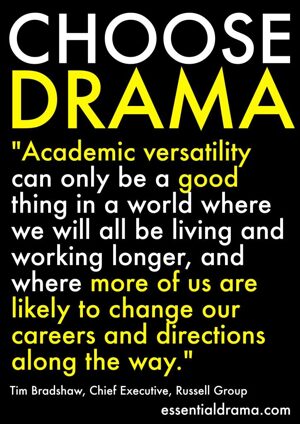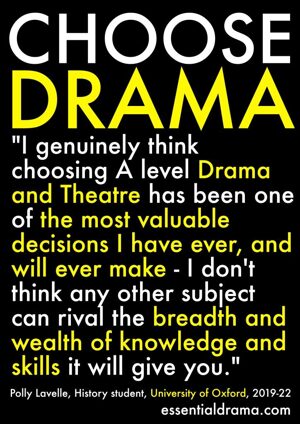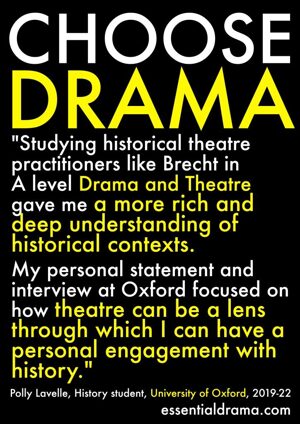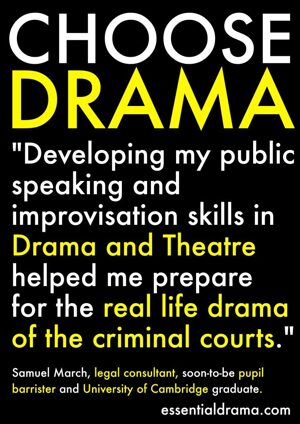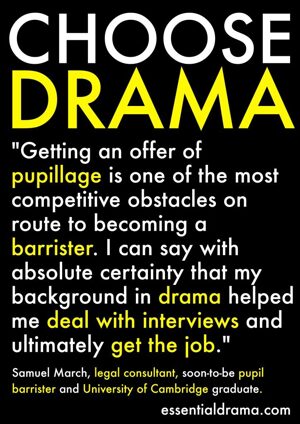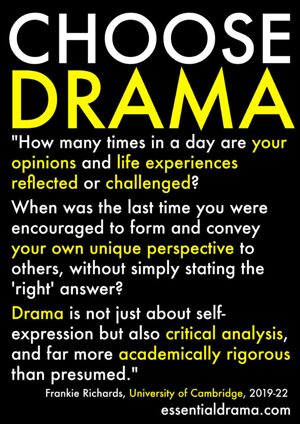- Home
- Curriculum
- Subject Curriculum
- Drama
Drama
Departmental approach to the curriculum
In an increasingly competitive world, speech and communication skills are becoming even more important. Through studying drama, students gain a greater sense of confidence about themselves, the ever-changing world around them and a greater capacity to express their opinions and beliefs to others. They develop their imagination, sensitivity and self-confidence through the exciting world of drama. Whether our students wish to become professional actors or designers or simply wish to develop their presentation, speech and communication skills, drama will be both stimulating and of great value in the world beyond education.
There is the opportunity to become involved in our annual School production either on stage, operating the sound and lighting or being part of our student-led stage crew.
Year 7
Students join Rickmansworth School with a varied knowledge of Drama and therefore we make it our mission to provide a challenging yet accessible curriculum for all. All Schemes for Learning allow the students to build their confidence and self esteem whilst articulating clearly their ideas and intentions. A focus is put on literacy in the form of script exploration, physical focus using ‘Movement, Mime and the Mask’ and the support and encouragement to help them develop and experiment with their vocal and physical skills to communicate meaning.
Year 8
Having acquired the necessary skills from year 7, the students continue to develop these during year 8. The curriculum in year 8 is challenging and dynamic. The students learn about ‘Empathy’ in our ‘Homeless’ Scheme for learning and this also allows a more intense focus on their truthfull performance skills whilst understanding the need for empathy basing their work on real life stories and events. There is script exploration studying ‘Ernie’s Incredible Illucinations’ which underpins their creativity and imagination. ‘Macbeth’ is brought to life in New York in the 1950’s. The focus is on the themes and issues within the play, the characters relationships and status and their objectives and obstacles. It also provides the opportunity of applying an accent to their chosen role. Key skills involve: interaction, vocal and physical decisions and the impact these have on the audience, challenging Dramatic Conventions and direct links to all the Ricky R’s.
Year 9
The main consideration is to give the opportunity to explore their changing world as adolescents. Pupils are encouraged to appreciate the skills needed for the adult world through role-play and in building more complex characters and situations. The exploration of form and structure is enhanced by the influence of key practitioners. Students become more sophisticated in their ability to evaluate their own and others’ work using theatrical terminology. During the year, students learn about Human Rights using historical events such as ‘Rosa Parks and her refusal to stand up’. From this stimulus, a monologue is written and then performed as an assessment piece. Learners also learn about the variety of Genre and Practitioners and apply their methodologies in practice. A whistle stop tour learning about the History of Theatre gives the students an understanding of how theatre originated in its’ Ancient form right up to the present day. During this many Playwrights and their work are explored.
Year 10 and 11
We study Eduqas GCSE Drama and the course will appeal to those who are interested in performing and/or the technical side of theatre. It promotes students’ involvement and enjoyment of Drama as performers, devisers, directors and designers and provides opportunities for students to watch live theatre and to develop their skills as informed and thoughtful audience members. This work will be supported by written coursework and a written examination. The course also supports speech and communication skills, promotes challenge and requires resilience. Three Components to work through over two years, compliments the examination requirements at KS5 where secure knowledge of Practitioner and Genre are key to success. Subject Specific Vocabulary, design and technical language and different styles of theatre have been embedded during the students’ journey through Key Stage 3. This underpins practical and written work at Key Stage 4; ultimately leading to Key Stage 5.
The following Assessment Criteria is as follows:
Component 1: Devising Theatre Non-exam assessment: internally assessed, externally moderated 40% of qualification. This is completed in the first term in Year 11. Our students will be assessed on either acting or design. They participate in the creation, development and performance of a piece of devised theatre using either the techniques of an influential theatre practitioner or a genre, in response to a stimulus set by Eduqas. Learners must produce a realisation of their piece of devised theatre, a portfolio of supporting evidence and an evaluation of the final performance or design.
Component 2: Performing from a Text and this is externally assessed by a visiting examiner and worth 20% of their qualification. Learners will be assessed on either acting or design. Learners study two extracts from the same performance text chosen by the centre. Learners participate in one performance using sections of text from both extracts. As we currently study 'I Love You Mum, I Promise I Won't Die’ by Mark Wheeller, these performance pieces need to be written pre 2000.
Component 3: Interpreting Theatre Written examination. This is 1 hour 30 minutes and worth 40% of the qualification. Section A:. The learners are required to answer set questions on an unseen extract from a list of Set Texts. We currently study: I Love You Mum, I Promise I Won't Die.
Section B: Live Theatre Review where the students are to answer one question, from a choice of two, requiring analysis and evaluation of a given aspect of a live theatre production seen during the course.
Year 12 and 13
The students study Edexcel Pearson Drama and Theatre A Level. The two year course will require the students to learn about different theatre practitioners, explore a varied range of performance texts practically alongside written analysis, developing creativity & independence to become effective theatre makers and apply critical thinking skills in practice. There are three Components that form part of the A Level programme of study. Component 1 is a Devising unit which culminates in a NEA at the end of Year 12 and this is supported by a written portfolio outlining the journey from ‘Page to Stage’ The Practitioner influence is Frantic Assembly. The students will undergo a 6x hour workshop with an actor or director from the company at the beginning of the A Level course in order that they can apply the company’s techniques to their own work. During year 12, the students also begin to explore the Set Texts for Component 3 - the written paper -Theatre Makers in Practice; ‘Equus’ by Peter Shaffer and ‘Woyzeck’ by George Buchner. After a visit to the theatre, the students also have to respond to statements in relation to the performance they have seen as informed audience members. Here they understand the examination requirements by working as performers, designers and directors and applying this knowledge and understanding to exam style questions.
Year 13
The students continue working towards Component 3 during their lessons. Alongside this, they are preparing for their final practical examination. This takes the form of a monologue or duologue performance and a group piece. This is externally examined by a visiting examiner between January and March.
The following Assessment Criteria is as follows:
Component 1: Devising (Component Code: 9DR0/01) Non-examination assessment and 40% of the qualification
The students are to devise an original performance piece using one key extract from a performance text and a theatre practitioner as stimuli. We currently use the play ‘100’ and Frantic Assembly as the Theatre Practitioner. There are Performer or designer routes available to our students. The students are examined at the end of year 12; internally assessed and externally moderated. There are two parts to the assessment: 1) a portfolio outlining the journey ‘from page to stage’ and this is worth 60 marks and can be handwritten/typed evidence between 2500–3000 words or recorded/verbal evidence between 12–14 minutes or - can be a combination of handwritten/typed evidence (between 1250–1500 words) and recorded/verbal evidence (between 6–7 minutes).
2) the devised performance/design realisation is worth 20 marks.
Component 2: Text in Performance (*Component Code: 9DR0/02) and worth 20% of the qualification.
The learners perform in a group performance or design realisation of one key extract from a performance text alongside performing a monologue or duologue performance or design realisation from one key extract from a different performance text. The Centre is responsible for the choice of performance texts. This part of the exam is externally assessed by a visiting examiner with an examination window of between January - March in year 13.
Group performance/design realisation is worth 36 marks.
Monologue or duologue or design realisation is worth 24 marks.
Component 3: Theatre Makers in Practice (*Paper Code: 9DR0/03)
This takes on the form of a written examination lasting 2 hours 30 minutes and worth 40% of the qualification. 80 marks awarded in total.
Section A: Live Theatre Evaluation and worth 20 marks. Students are to answer one extended response question from a choice of two requiring them to analyse and evaluate a live theatre performance they have seen in light of a given statement. The students are allowed to bring in theatre evaluation notes of up to a maximum of 500 words.
Section B: Page to Stage: Realising a Performance Text. This is worth 36 marks. The students answer two extended response questions based on an unseen extract from the performance text they have studied. We currently study ‘Equus’ by Peter Shaffer. Our Learners will demonstrate how they, as theatre makers, intend to realise the extract in performance whilst referencing the text as a whole. Students will answer from the perspective of a performer and a designer.
Section C: Interpreting a Performance Text. This is worth 24 marks. The students are required to answer one extended response question from a choice of two based on an unseen named section from their chosen performance text. We currently study ‘Woyzeck’ by George Buchner and apply the methodologies of Bertolt Brecht to the text. Our learners will demonstrate how their re-imagined production concept will communicate ideas to a contemporary audience. The students will also need to outline how the work of their chosen theatre practitioner has influenced their overall production concept and demonstrate an awareness of the performance text in its original performance conditions.
Long Term Curriculum Overviews
'The Big Picture' Curriculum Map
'The Big Picture' Curriculum Map
This document will provide a visual overview of the department's curriculum from Key Stages 3 to 5. This is in a student-friendly format to support them in their understanding the of the department's curriculum.
Assessment
Department Assessment Matrix
This document will provide an overview for assessment for Key Stages 3, 4 and 5.
Assessment Matrix - Drama
Key Stage 3 Judgement Descriptors
These documents give you an overview of the criteria for Emerging, Developing, Secure and Mastery judgements at KS3 for this subject.
KS3 Judgement Descriptors - Drama - Year 7
Home Learning
Home learning at Key Stage 3 is used to consolidate students' learning; to learn lines, write a monologue and to conduct research when necessary. This is to be applied and assessed as part of the ‘recall / do now’ section at the beginning of the lesson. Students in KS3 are set home learning once a half term. Feedback on home learning at KS3 is by verbal teacher feedback.
In Key Stage 4 and 5, home learning is tailored towards the components of the examination specification. Students will be set theoretical tasks over the two week timetable. This is typically centred around consolidation, recap, rehearsal techniques and development of practical content in relation to the appropriate examination specification. Feedback and marks given for essay writing home learning will be applied using the examination marking criteria for each section of the written examination.
Other forms of home learning will be Flipped Learning in preparation for the following lesson. This will be checked by the class teacher through questioning and checking either folders or the Google Classroom Assignment section.
How can you help your child succeed in drama?
Parents and carers can support their child by seeing as much live theatre as is possible. This doesn't have to be West End / National Theatre productions, local amateur productions can be just as valuable, informative and entertaining.
The texts studied across the Key Stages, should your child wish to read them are outlined below:
Texts studied at Key Stage 3 are:
'Two Weeks with the Queen' and 'The Tempest - year 7
'Ernie's Incredible Illucinations' and 'Macbeth' - year 8
'DNA' - year 9
The set text for GCSE is 'I Love You Mum, I Promise I Won't Die' by Mark Wheeller, and this is explored practically through years 10 and 11; which fully supports our students in preparing for the written paper.
The set texts for A Level are: 'Woyzeck' by George Buchner, 'Equus' by Peter Shaffer and '100' by Christopher Heimann.
All Home Learning can be tracked using the relevant Google Classroom and resources can also be located on Google Classroom.
Family and friends are invited to attend examination performances at Key Stage 4 & 5. There is also a performance from the Key Stage 3 Drama Club which can be supported by friends and family.
Helpful websites and further information
KS4:
YouTube - The Making of... I Love You Mum, I Promise I Won't Die
YouTube - I Love You Mum... Official PromoYouTube - BBC London: Daniel Spargo-Mabbs death
Drama Resource Pack - I Love You Mum I Promise I Won't Diei love you mum i promise i won't die revision guideKS5:
pearson/edexcel a-levels drama and theatre QualificationPearson/Edexcel A-Levels Drama and Theatre - Published Resources
Careers in Drama
